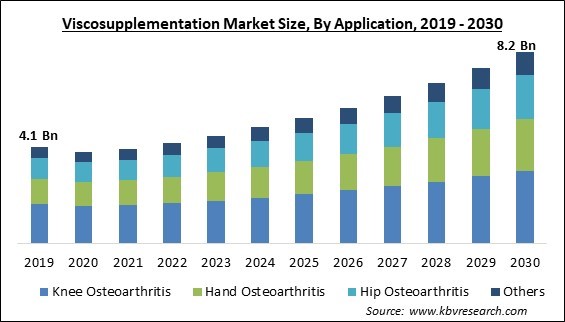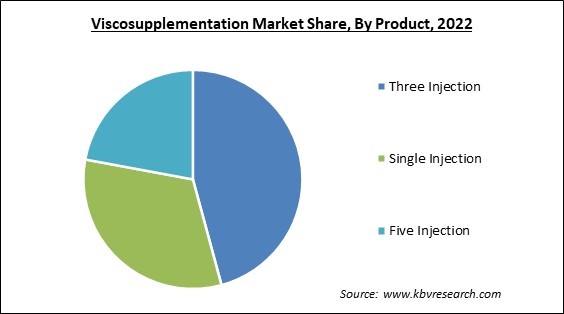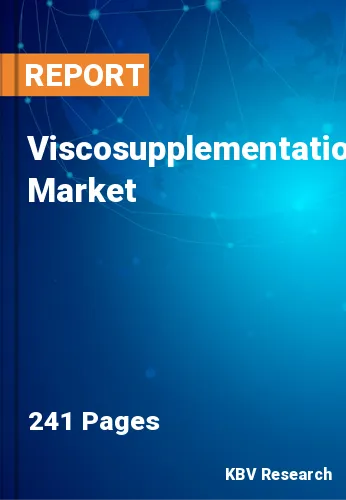The Global Viscosupplementation Market size is expected to reach $8.2 billion by 2030, rising at a market growth of 8.6% CAGR during the forecast period.
The North America region will capture around 30% share in the market by 2030. Due to factors like the increasing incidence of osteoarthritis and related disorders, the growing geriatric population, the well-developed healthcare infrastructure, and increasing demand for non-surgical procedures. The demand for viscosupplementation is increasing due to the rising prevalence of arthritis, osteoarthritis, and knee pain. Some of the factors impacting the market are increased demand for minimally invasive therapies, increasing elderly population with osteoarthritis, and increase in cardiovascular risk due to use of NSAIDs for osteoarthritis.

Less pain, fewer complications, and a shortened hospital stay are associated with minimally invasive surgery. Minimally invasive surgical techniques are used to perform procedures in the fields of cardiothoracic surgery, gastroesophageal reflux disease, gastroenterology, gynecological surgery, heart surgery, pediatric surgery, urogynecology and pelvic reconstructive surgery, and urological surgery. Minimally invasive procedures can be used for both diagnostic and therapeutic procedures. Furthermore, due to age-related changes in the body, such as impaired cartilage repair capacity and changes in joint structure, which contribute to the disease's development and progression, elderly persons are more prone to various health issues, including osteoarthritis. The incidence of OA is predicted to increase, putting a substantial burden on people, health systems, and social care systems around the world due to the rise in the geriatric population and the high prevalence of obesity. According to the Arthritis Foundation, osteoarthritis will affect 130 million people globally by 2050. Therefore, the rising demand for minimally invasive therapy and growth in the number of elderly populations with osteoarthritis will aid in increasing demand for viscosupplementation treatments, thereby driving market growth.
However, patients with osteoarthritis commonly use OTC and prescription NSAIDs to alleviate discomfort. According to a 2019 National Center for Biotechnology Information report, NSAIDs are administered to more than 50% of osteoarthritis patients in the US. In Europe, 60% of osteoarthritis patients receiving prescription medications (47%) were prescribed NSAIDs. The use of NSAIDs raises the risk of adverse cardiovascular events. Patients' CVD risk is increased by cyclooxygenase (COX)-2 selective NSAIDs (coxibs) and non-selective NSAIDs. Heart failure (HF), increased blood pressure, atrial fibrillation, and venous thromboembolism are further patient-important events. This factor poses a challenge for the market. Additionally, market expansion for viscosupplementation was adversely affected by the COVID-19 outbreak. Most procedures were canceled or delayed during the COVID-19 pandemic because viscosupplementation was a non-emergency procedure. It, therefore, reduced the demand for viscosupplementation and prevented market expansion. The market was also significantly impacted because most viscosupplementation product users are senior citizens. This group was generally advised to stay home to lower the risk of infection.
By product, the market is categorized into single injection, three injection, and five injections. The single injection segment covered a considerable revenue share in the market in 2022. Over the projected period, the single-injection segment is anticipated to increase the fastest. These injections are relatively new on the market but are growing quickly due to their shorter regimen, fewer hospital visits, lack of side effects, and low discomfort.

By application, the market is divided into knee osteoarthritis, hand osteoarthritis, hip osteoarthritis, and others. The knee osteoarthritis segment acquired the maximum revenue share in the market in 2022. Because of recent improvements in life expectancy as well as body mass index (BMI), it is thought that knee osteoarthritis (OA) has become common nowadays. Strong evidence suggests that the breakdown of tissues in joints brought on by mechanical strain and inflammation is the primary cause of knee OA.
Based on end-use, the market is bifurcated into hospitals and orthopedic clinics/ASCs. In 2022 the orthopedic clinics/ASCs segment witnessed the largest revenue share in the market. Due to ASCs' ability to do same-day procedures including ACL reconstruction, hip, knee, and shoulder replacements, among others, the clinics/ASCs segment is also predicted to expand at the quickest rate. These operations are less complex and require minimal hospitalization.
| Report Attribute | Details |
|---|---|
| Market size value in 2022 | USD 4.3 Billion |
| Market size forecast in 2030 | USD 8.2 Billion |
| Base Year | 2022 |
| Historical Period | 2019 to 2021 |
| Forecast Period | 2023 to 2030 |
| Revenue Growth Rate | CAGR of 8.6% from 2023 to 2030 |
| Number of Pages | 241 |
| Number of Table | 350 |
| Report coverage | Market Trends, Revenue Estimation and Forecast, Segmentation Analysis, Regional and Country Breakdown, Companies Strategic Developments, Company Profiling |
| Segments covered | Product, Application, End-use, Region |
| Country scope | US, Canada, Mexico, Germany, UK, France, Russia, Spain, Italy, China, Japan, India, South Korea, Singapore, Malaysia, Brazil, Argentina, UAE, Saudi Arabia, South Africa, Nigeria |
| Growth Drivers |
|
| Restraints |
|
Region wise, the market is analyzed across into North America, Europe, Asia Pacific, and LAMEA. In 2022 the Asia Pacific region dominated the market by generating the highest revenue share. One of the key factors boosting the market in this region is the presence of elderly population prone to osteoarthritis. In addition, many individuals in the Asia Pacific region prefer non-surgical treatment options due to cultural beliefs, fear of surgery, and the desire to avoid post-operative complications. Viscosupplementation offers a minimally invasive alternative to surgical interventions like joint replacement.
Free Valuable Insights: Global Viscosupplementation Market size to reach USD 8.2 Billion by 2030
The market research report covers the analysis of key stakeholders of the market. Key companies profiled in the report include DePuy Synthes (Johnson & Johnson), Sanofi S.A., Zimmer Biomet Holdings, Inc., Ferring Holdings SA, F. Hoffmann-La Roche Ltd., LG Chem Ltd. (LG Corporation), Anika Therapeutics, Inc., Fidia Farmaceutici S.p.A. (P&R Farmaceutici S.p.A), Smith & Nephew PLC and Seikagaku Corp.
By Application
By Product
By End-use
By Geography
This Market size is expected to reach $8.2 billion by 2030.
Increased demand for minimally invasive therapies are driving the Market in coming years, however, NSAIDs for osteoarthritis may increase cardiovascular risk restraints the growth of the Market.
DePuy Synthes (Johnson & Johnson), Sanofi S.A., Zimmer Biomet Holdings, Inc., Ferring Holdings SA, F. Hoffmann-La Roche Ltd., LG Chem Ltd. (LG Corporation), Anika Therapeutics, Inc., Fidia Farmaceutici S.p.A. (P&R Farmaceutici S.p.A), Smith & Nephew PLC and Seikagaku Corp.
The expected CAGR of this Market is 8.6% from 2023 to 2030.
The Three Injection segment is leading the Market by Product in 2022: thereby, achieving a market value of $3.6 billion by 2030.
The Asia Pacific region dominated the Market by Region in 2022 and would continue to be a dominant market till 2030; thereby, achieving a market value of $3.1 billion by 2030.
Our team of dedicated experts can provide you with attractive expansion opportunities for your business.

